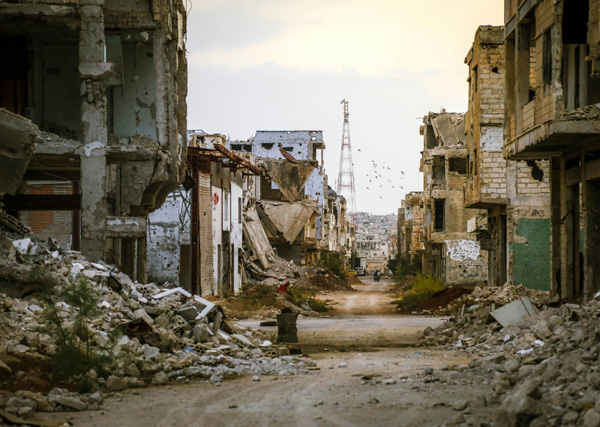Syria’s Assad regime overthrown

[An image of a destroyed street in Syria. Photo Credit to Unsplash]
On December 8th, President Bashar al-Assad of Syria abandoned Damascus, ending his presidency and the 53-year-old rule of the Assad regime.
Opposition forces rushed into the capital in the early hours of Sunday, declaring the nation’s liberation from the longtime autocratic rule.
The dramatic overthrow follows a sustained military campaign that began on November 27th, when a coalition of opposition fighters launched a decisive offensive against pro-government forces, beginning in Aleppo, Syria’s second-largest city.
These opposition forces, which have waged a resistance against Assad’s rule since the Syrian civil war erupted in 2011, announced the formation of a Syrian Transitional Government to act as a provisional authority.
The regime’s collapse comes after years of escalating pressure with Assad’s government increasingly dependent on military support from Russia and Iran while struggling under severe financial strain.
Following the opposition’s victory, celebrations erupted across major cities such as Aleppo, Homs and Idlib.
Citizens expressed optimism for Syria’s democratic future.
The international community has responded with mixed reactions to the formation of the Syrian Transitional Government.
Countries including the United States and Turkey, along with the European Union, have welcomed the change and voiced their support for the transitional authority.
They emphasized the crucial need for free and fair elections to ensure the legitimacy of the new government.
On the other hand, longtime Assad allies Russia and Iran have maintained a conspicuous silence, raising questions about their future role in Syrian affairs.
The new government faces monumental challenges in rebuilding a nation devastated by more than a decade of civil war.
Primary among these is addressing the severe humanitarian crisis affecting millions of displaced Syrians, both within the country and in neighboring nations.
The immediate priorities include restoring basic services such as food, water, healthcare, and education.
Equally daunting is the task of reconstructing Syria’s shattered infrastructure.
Years of conflict have left cities, roads, schools, and hospitals in ruins, requiring substantial international aid and investment for reconstruction.
The reconstruction process requires a lot of financial resources and expertise, which the transitional government is looking for in international aid and investment.
Moreover, the transitional government faces the complex challenge of national reconciliation among a population divided by ethnic, sectarian, and political differences.
The international community has also stressed the importance of taking accountability for the war crimes and human rights abuses committed during the civil war.
Despite the obstacles ahead, many Syrians view the fall of the Assad regime as a potential turning point for their nation.
Intelligence sources indicate that the whereabouts of al-Assad and his Defence Minister Ali Abbas are yet to be confirmed, but officials suspect they may have fled to Dubai.

- NaEun Hong / Grade 9
- Chadwick International

![THE HERALD STUDENT REPORTERS [US]](/assets/images/logo_student_us.png)
![THE HERALD STUDENT REPORTERS [Canada]](/assets/images/logo_student_ca.png)
